The Deeper Thinking Podcast
The Deeper Thinking Podcast The Deeper Thinking Podcast offers a space where philosophy becomes a way of engaging more fully and deliberately with the world. Each episode explores enduring and emerging ideas that deepen how we live, think, and act. We follow the spirit of those who see the pursuit of wisdom as a lifelong project of becoming more human, more awake, and more responsible. We ask how attention, meaning, and agency might be reclaimed in an age that often scatters them. Drawing on insights stretching across centuries, we explore how time, purpose, and thoughtfulness can quietly transform daily existence. The Deeper Thinking Podcast examines psychology, technology, and philosophy as unseen forces shaping how we think, feel, and choose, often beyond our awareness. It creates a space where big questions are lived with—where ideas are not commodities, but companions on the path. Each episode invites you into a slower, deeper way of being. Join us as we move beyond the noise, beyond the surface, and into the depth, into the quiet, and into the possibilities awakened by deeper thinking.
Episodes
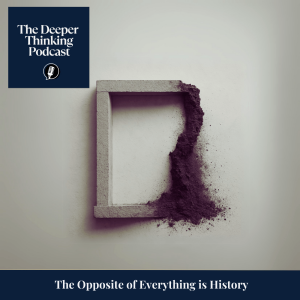
Sunday Apr 06, 2025
Sunday Apr 06, 2025
The Opposite of Everything is History
The Deeper Thinking Podcast
What remains after structure collapses.
What begins as a system of oppositions—raw and cooked, myth and meaning, structure and freedom—unravels across nine recursive movements. This episode enters the elegant collapse of structuralism, tracing not a theory, but its residue. Through Claude Lévi-Strauss, Gregory Bateson, Jean-Paul Sartre, Gayle Rubin, Jacques Derrida, Emmanuel Levinas, Sylvia Wynter, and Édouard Glissant, we follow a shift from form to relation, from certainty to flicker.
This essay does not explain. It listens. It does not resolve. It disturbs. It follows structure until it can no longer hold—and then it asks what flickers after: silence, relation, and the right to opacity.
Why Listen?
Learn how structuralism framed cognition through oppositions
See how poststructuralism undoes clarity from within
Feel the shift from pattern to residue, from system to echo
Follow the drift from myth to opacity, from form to relation
Further Reading
The Raw and the Cooked – Claude Lévi-Strauss
The Sex/Gender System – Gayle Rubin
Of Grammatology – Jacques Derrida
Poetics of Relation – Édouard Glissant
Unsettling the Coloniality of Being – Sylvia Wynter
Listen On:
YouTube
Spotify
Apple Podcasts
Support This Work
If you'd like to support the ongoing work, you can visit buymeacoffee.com/thedeeperthinkingpodcast or leave a kind review on Apple Podcasts.
Bibliography
Lévi-Strauss, Claude. The Raw and the Cooked. University of Chicago Press, 1969.
Rubin, Gayle. The Traffic in Women: Notes on the 'Political Economy' of Sex. In Toward an Anthropology of Women, 1975.
Derrida, Jacques. Of Grammatology. Johns Hopkins University Press, 1976.
Glissant, Édouard. Poetics of Relation. University of Michigan Press, 1997.
Wynter, Sylvia. Unsettling the Coloniality of Being/Power/Truth/Freedom. New Centennial Review, 2003.
Bibliography Relevance
Claude Lévi-Strauss: Introduced structuralism, analyzing myths through binary oppositions in The Raw and the Cooked.
Gayle Rubin: Explored the "sex/gender system," critiquing how gender roles are constructed and maintained.
Jacques Derrida: Developed deconstruction, challenging the idea of fixed meanings in texts.
Édouard Glissant: Advocated for the "right to opacity," emphasizing the importance of cultural diversity and relation.
Sylvia Wynter: Critiqued Western humanism, highlighting the coloniality of being and advocating for new humanistic paradigms.
To listen is to leave the frame.
#Structuralism #ClaudeLéviStrauss #Poststructuralism #JacquesDerrida #SylviaWynter #ÉdouardGlissant #GregoryBateson #GayleRubin
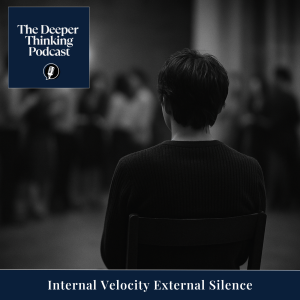
Saturday Apr 05, 2025
Saturday Apr 05, 2025
Internal Velocity External Silence
What happens when you stop being the version of yourself that everyone loved — and realize you never fully inhabited it?
This episode unfolds the psychic aftermath of chronic likability: the internal spinning that begins once the performance dissolves. Framed by trauma, ADHD, and the deep structures of people-pleasing, the essay refuses clarity in favor of recursive presence. Through unspoken friction, memory collapse, and epistemic silence, we trace a self that never arrives — but remains. It is not healing. It is residence.
Inspired by thinkers like Lauren Berlant, Byung-Chul Han, and Judith Butler, this episode offers no advice, no redemption. Just motion. Thought in the form of atmosphere.
Why Listen?
Explore how diagnosis reframes — but doesn’t resolve — a lifetime of adaptive performance
Hear what loneliness sounds like after applause fades
Encounter philosophical thought as breath, not argument
Follow a self that refuses to stabilize for recognition
Further Reading
The Burnout Society – Byung-Chul Han
Undoing Gender – Judith Butler
The Hour of the Star – Clarice Lispector
As an Amazon Associate, we may earn from qualifying purchases.
Listen Now
YouTube
Spotify
Apple Podcasts
Bibliography
Berlant, Lauren. Cruel Optimism. Durham, NC: Duke University Press, 2011.
Butler, Judith. Undoing Gender. New York: Routledge, 2004.
Han, Byung-Chul. The Burnout Society. Translated by Erik Butler. Stanford, CA: Stanford University Press, 2015.
Lispector, Clarice. The Hour of the Star. Translated by Benjamin Moser. New York: New Directions, 2011.
Simondon, Gilbert. Individuation in the Light of Notions of Form and Information. Translated by Taylor Adkins. Minneapolis: University of Minnesota Press, 2020.
Fanon, Frantz. Black Skin, White Masks. Translated by Richard Philcox. New York: Grove Press, 2008.
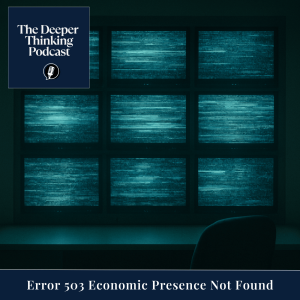
Friday Apr 04, 2025
Friday Apr 04, 2025
Economic Presence Not Found
The Deeper Thinking Podcast
A screen flickers. The system is online. But something is missing. The data flows, the dashboards update, the lights stay on—but presence has vanished. This episode explores the emotional and philosophical latency within modern economic systems: the places where stress becomes unreadable, suffering becomes delay, and meaning dissolves into metrics. The glitch, once a sign of failure, now becomes the only way emotion survives.
This isn’t a story of collapse. It’s a recursive silence. A world that continues functioning while comprehension quietly disappears. Through subtle images of breath, blinking cursors, and ghosted financial phrases, the essay traces a deeper contradiction: the system is working as designed, but the design excludes the human. Pain remains—but without language, without response, without logoff.
What happens when the software doesn’t crash—but we do?
Why Listen?
A haunting philosophical portrait of emotional illegibility in automated systems
Insight into the glitch as a form of emotional survival
A recursive meditation on latency, economic logic, and the absence of presence
An original conceptual lens on system design, affect, and contradiction
Further Listening / Reading
As an affiliate, we may earn from qualifying purchases through these links.
Psychopolitics by Byung-Chul HanAmazon link
24/7: Late Capitalism and the Ends of Sleep by Jonathan CraryAmazon link
Listen On:
YouTube
Spotify
Apple Podcast
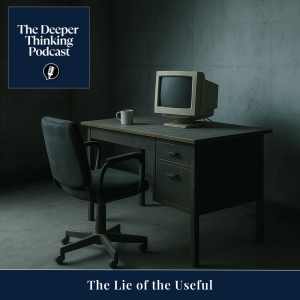
Friday Apr 04, 2025
Friday Apr 04, 2025
The End of Usefulness: AI, Automation, and the Quiet Return to Being
The Deeper Thinking Podcast
A quiet reckoning with the values we never questioned, and the selves we lost to usefulness.
Artificial intelligence (AI) is taking our jobs. But that isn’t the problem. This episode explores what lies beneath the fear of automation—not economic disruption, but the quiet exposure of a system that never truly valued us beyond our usefulness. When the machines arrive, it is not just work that disappears. It is the illusion that dignity was ever built into the code.
This is not a technological crisis. It is a philosophical unmasking. For generations, usefulness was mistaken for virtue, and exhaustion for proof of worth. But AI does not believe in effort. It does not reward loyalty. It simply reveals that the system we trusted was never designed to care. And in that exposure, something else emerges: a deeper silence, a chance to see what might remain when function is no longer the measure of being.
What happens when usefulness ends, and we are still here?
Reflections
What if productivity was never a moral virtue, just an imposed metric?
Can worth exist independently of contribution?
Is the fear of AI really a fear of no longer being needed?
What remains when function is no longer our identity?
How do we learn to dwell in a world that no longer measures us?
Why Listen?
Understand the philosophical implications of AI beyond economics
Explore how usefulness became a moral metric in capitalist systems
Examine the emotional and existential impact of automation
Hear a quiet argument for reclaiming value outside of function
Listen On:
YouTube
Spotify
Apple Podcasts
Support This Work
If you'd like to support the ongoing work, you can visit buymeacoffee.com/thedeeperthinkingpodcast or leave a kind review on Apple Podcasts.
Bibliography
Arendt, Hannah. The Human Condition. University of Chicago Press, 1958.
Byung-Chul Han. The Burnout Society. Stanford University Press, 2015.
Heidegger, Martin. Being and Time. Harper & Row, 1962.
Illich, Ivan. Tools for Conviviality. Marion Boyars, 1973.
Lazzarato, Maurizio. The Making of the Indebted Man. Semiotext(e), 2012.
Stiegler, Bernard. Technics and Time, Vol. 1: The Fault of Epimetheus. Stanford University Press, 1998.
Turkle, Sherry. Alone Together. Basic Books, 2011.
Bostrom, Nick. Superintelligence. Oxford University Press, 2014.
Christian, Brian. The Alignment Problem. Norton, 2020.
Tegmark, Max. Life 3.0. Knopf, 2017.
Crawford, Kate. Atlas of AI. Yale University Press, 2021.
Suleyman, Mustafa. The Coming Wave. Crown, 2023.
Zuboff, Shoshana. The Age of Surveillance Capitalism. PublicAffairs, 2019.
Bibliography Relevance
Arendt: Illuminates how labor, work, and action are ethically distinct yet historically conflated.
Byung-Chul Han: Frames burnout as a systemic, not individual, pathology of hyperperformance culture.
Heidegger: Offers an ontological alternative to usefulness as the measure of being.
Illich: Invites a revaluation of tools through conviviality and autonomy.
Lazzarato: Exposes debt as a form of moral subjugation masked as personal responsibility.
Stiegler: Examines technical memory and its effect on human individuation and temporality.
Turkle: Tracks emotional dislocation in increasingly technologised relational landscapes.
Bostrom: Warns of strategic risks posed by runaway machine intelligence.
Christian: Details the ethical tension of aligning AI behavior with human values.
Tegmark: Argues for proactive design of AI futures aligned with human flourishing.
Crawford: Maps the extractive logic beneath the global AI infrastructure.
Suleyman: Predicts structural shocks from AI beyond regulatory containment.
Zuboff: Reveals how behavioral data has become a raw material for power.
When usefulness ends, we begin.
#ArtificialIntelligence #Capitalism #Automation #Existentialism #Burnout #Heidegger #Arendt #ByungChulHan #Stiegler #ProductivityMyth #Philosophy #PostWork #TheDeeperThinkingPodcast
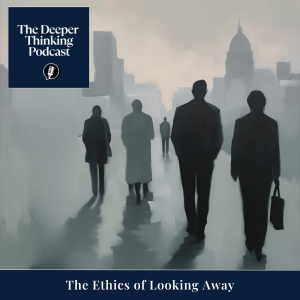
Thursday Apr 03, 2025
Thursday Apr 03, 2025
The Ethics of Looking Away
The Deeper Thinking Podcast
In the spaces between relentless images of suffering and the quiet moments of retreat, there exists a hidden moral tension. What if the act of turning away is not mere indifference, but a necessary, human response to overwhelming despair? This episode delves into the paradox where the refusal to continuously witness becomes both a survival strategy and a silent commentary on our limited capacity to care. It explores how, amid the constant barrage of trauma, the very decision to look away can articulate a profound ethical dilemma—a quiet protest against the unyielding demands of exposure.
The act of disengagement is not a moral failing but a testament to human vulnerability. It challenges the notion that unbroken vigilance is the measure of virtue, inviting reflection on the ethical weight of pausing—of choosing to shield oneself from relentless pain.
Why Listen?
Understand how turning away can reveal deeper moral complexities.
Explore the interplay between overwhelming exposure and ethical self-preservation.
Reflect on the limits of empathy in an age of perpetual crisis.
Question the true cost of unending vigilance versus deliberate pause.
Further Reading
The Origins of Totalitarianism by Hannah Arendt – A deep dive into the rise of totalitarian regimes and the role of bureaucracy in facilitating evil.
The Human Condition by Hannah Arendt – Examines the nature of political life and the importance of public action.
Eichmann in Jerusalem by Hannah Arendt – The landmark work that introduced the concept of the "banality of evil."
Listen On:
YouTube
Spotify
Apple Podcasts
Abstract
This episode interrogates the ethical and psychological dynamics of turning away from the relentless barrage of suffering. It examines the tension between moral obligation and self-preservation, exploring whether the act of looking away constitutes a moral failing or a necessary form of survival. Drawing on the philosophical insights of thinkers such as Hannah Arendt, Susan Sontag, and John Berger, the discussion reveals how the burden of constant witnessing can erode empathy and overwhelm human capacity. By challenging the assumption that perpetual vigilance is inherently virtuous, the episode invites listeners to reconsider the ethics of attention, offering a reflective space where the quiet power of deliberate disengagement emerges as a potent, if painful, form of resistance.
Bibliography
Arendt, Hannah. The Origins of Totalitarianism. New York: Harcourt, Brace & World, 1951.
Arendt, Hannah. The Human Condition. Chicago: University of Chicago Press, 1958.
Arendt, Hannah. Eichmann in Jerusalem: A Report on the Banality of Evil. New York: Viking, 1963.
Butler, Judith. Frames of War: When Is Life Grievable? London: Verso, 2009.
Berger, John. Ways of Seeing. London: Penguin Books, 1972.
Sontag, Susan. Regarding the Pain of Others. New York: Farrar, Straus and Giroux, 2003.
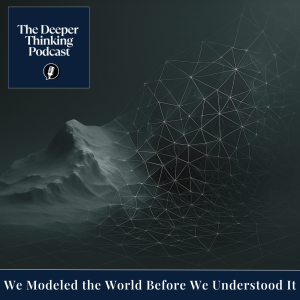
Monday Mar 31, 2025
Monday Mar 31, 2025
We Modeled the World Before We Understood It
The Deeper Thinking Podcast
What if science no longer uncovered reality—but generated it?
In an age where AlphaFold predicts faster than biology can observe, and where generative AI simulates truth before it’s tested, the foundations of knowledge begin to shift. This episode explores a quiet revolution in epistemology—one catalyzed by systems trained not to understand, but to perform. When output precedes insight, and the scientific method fades from the spotlight, what does discovery become?
This is not speculation. It’s already here. In computational biology, in climate models, in machine-generated theorems—experience is shaped by architectures that do not require observation. If Kuhn’s paradigms were overturned by anomalies, today’s paradigms are overwritten by structures that exceed justification altogether.
But this is not just a technical shift. It is philosophical, ethical, and human. As observers retreat and models take precedence, we must ask: who decides which version of reality matters? What remains of meaning when the world is rendered before it is known? This episode traverses a new terrain—where simulation precedes perception, and epistemology yields to design.
Reflections
Is science still discovery—or is it now architecture?
Can knowledge survive if the path to it is no longer empirical?
What happens when coherence replaces correspondence as a truth criterion?
Do generative systems liberate or displace the human imagination?
What new responsibilities emerge when models outrun meaning?
Why Listen?
Understand the shift from empirical science to generative architectures
Explore how AI reconfigures knowledge, observation, and epistemic trust
Unpack the ethical dilemmas of simulation-first scientific practice
Reflect on meaning-making in a modelled world
Listen On:
YouTube
Spotify
Apple Podcasts
Support This Work
If you'd like to support the ongoing work, you can visit buymeacoffee.com/thedeeperthinkingpodcast or leave a kind review on Apple Podcasts.
Bibliography
Arendt, Hannah. The Human Condition. 2nd ed. Chicago: University of Chicago Press, 1998.
Bachelard, Gaston. The New Scientific Spirit. Translated by Arthur Goldhammer. Boston: Beacon Press, 1984.
Baudrillard, Jean. Simulacra and Simulation. Translated by Sheila Faria Glaser. Ann Arbor: University of Michigan Press, 1994.
Bridle, James. Ways of Being: Beyond Human Intelligence. New York: Farrar, Straus and Giroux, 2022.
Crawford, Kate. Atlas of AI: Power, Politics, and the Planetary Costs of Artificial Intelligence. New Haven: Yale University Press, 2021.
Deleuze, Gilles. Difference and Repetition. Translated by Paul Patton. New York: Columbia University Press, 1994.
Feyerabend, Paul. Against Method. London: Verso Books, 1975.
Floridi, Luciano. The Philosophy of Information. Oxford: Oxford University Press, 2011.
Frigg, Roman, and Stephan Hartmann. “Models in Science.” In The Stanford Encyclopedia of Philosophy, edited by Edward N. Zalta. Summer 2022. https://plato.stanford.edu/entries/models-science/.
Hacking, Ian. Representing and Intervening: Introductory Topics in the Philosophy of Natural Science. Cambridge: Cambridge University Press, 1983.
Haraway, Donna. “A Cyborg Manifesto: Science, Technology, and Socialist-Feminism in the Late Twentieth Century.” In Simians, Cyborgs, and Women: The Reinvention of Nature, 149–181. New York: Routledge, 1991.
Hayles, N. Katherine. How We Became Posthuman: Virtual Bodies in Cybernetics, Literature, and Informatics. Chicago: University of Chicago Press, 1999.
Jonas, Hans. The Imperative of Responsibility: In Search of an Ethics for the Technological Age. Chicago: University of Chicago Press, 1984.
Kuhn, Thomas S. The Structure of Scientific Revolutions. 2nd ed. Chicago: University of Chicago Press, 1970.
Lazzarato, Maurizio. The Making of the Indebted Man. Los Angeles: Semiotext(e), 2012.
Mitchell, Melanie. Artificial Intelligence: A Guide for Thinking Humans. New York: Farrar, Straus and Giroux, 2019.
Morozov, Evgeny. To Save Everything, Click Here: The Folly of Technological Solutionism. New York: PublicAffairs, 2013.
O’Neil, Cathy. Weapons of Math Destruction: How Big Data Increases Inequality and Threatens Democracy. New York: Crown Publishing Group, 2016.
Parisi, Luciana. Contagious Architecture: Computation, Aesthetics, and Space. Cambridge, MA: MIT Press, 2013.
Popper, Karl. The Logic of Scientific Discovery. London: Routledge, 1959.
Sloterdijk, Peter. Foams: Spheres Volume III: Plural Spherology. Translated by Wieland Hoban. Los Angeles: Semiotext(e), 2016.
Tsing, Anna Lowenhaupt. The Mushroom at the End of the World: On the Possibility of Life in Capitalist Ruins. Princeton: Princeton University Press, 2015.
Vespignani, Alessandro. “Predicting the Behavior of Techno-Social Systems.” Science 325, no. 5939 (2009): 425–428.
Wiener, Norbert. The Human Use of Human Beings: Cybernetics and Society. Boston: Houghton Mifflin, 1950.
Winsberg, Eric. Science in the Age of Computer Simulation. Chicago: University of Chicago Press, 2010.
Before we understood the world, we modeled it. Now the model waits for us to catch up.
#GenerativeAI #SciencePhilosophy #Simulation #ThomasKuhn #Posthumanism #ModelledReality #Bachelard #Hayles #Crawford #Haraway #TheDeeperThinkingPodcast

Sunday Mar 30, 2025
Sunday Mar 30, 2025
The Noise Inside the Silence
The Deeper Thinking Podcast
What if silence doesn’t bring peace, but exposure? What if the moment the world quiets is when the true noise begins—the echo of thought, the return of memory, the body’s forgotten ache?
This episode explores a deeper paradox: that the promise of stillness often collides with the chaos it reveals. Influenced by the writings of Simone Weil, Merleau-Ponty, and Peter Levine, we enter a philosophical and psychological soundscape where silence is not a void, but a mirror—a place where everything held back begins to rise.
From emotional backlog to somatic memory, the Listener is guided through the textures of inner noise that emerge when distraction falls away. This isn’t about mindfulness as mastery. It’s about contact. What happens when you stop running, and finally hear what’s been with you all along?
Silence, in this telling, is not a retreat. It’s a return—fraught, luminous, and alive with tension. For those who’ve felt unsettled in the quiet, this episode offers not escape, but recognition.
Why Listen?
To reframe silence not as absence, but as presence—dense with emotional and psychological resonance
To explore the hidden structure of inner chaos through the lens of philosophy and somatic psychology
To engage with thinkers like Simone Weil, Maurice Merleau-Ponty, and Peter Levine in a deeply accessible way
To feel seen in the overwhelming moment when the world goes quiet, but the mind does not
Further Reading
As an affiliate, we may earn from qualifying purchases through these links.
Gravity and Grace by Simone Weil — A meditation on suffering, attention, and the sacred tension of stillness.Amazon link
Phenomenology of Perception by Maurice Merleau-Ponty — On the body as the first site of meaning and memory.Amazon link
Waking the Tiger by Peter Levine — A guide to understanding trauma and the body’s somatic intelligence.Amazon link
Listen On:
YouTube
Spotify
Apple Podcasts
Abstract
This essay investigates the paradoxical nature of silence, not as a peaceful void, but as an intensifying presence that reveals hidden layers of emotion, memory, and embodiment. Drawing on the works of Simone Weil, Maurice Merleau-Ponty, and Peter Levine, it explores how stillness can act as a mirror that reflects the psychological and somatic residues often masked by the noise of daily life. Rather than offering comfort, silence is shown to provoke confrontation with what has been repressed or unattended. The essay positions silence not as the endpoint of mindfulness or meditative practice, but as an encounter—charged with unresolved tension, vulnerability, and the potential for recognition. Through the lens of phenomenology and trauma theory, silence becomes a threshold where thought deepens, sensation awakens, and the Listener is invited into contact with the noise within.
Bibliography
Levine, Peter A. Waking the Tiger: Healing Trauma. North Atlantic Books, 1997.Merleau-Ponty, Maurice. Phenomenology of Perception. Translated by Donald A. Landes, Routledge, 2012.Weil, Simone. Gravity and Grace. Translated by Emma Craufurd, Routledge, 2002.
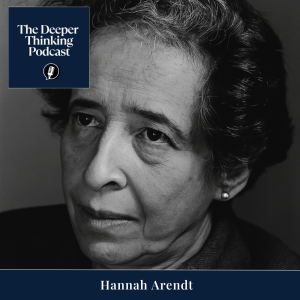
Saturday Mar 29, 2025
Saturday Mar 29, 2025
Hannah Arendt: The Quiet Power of Thoughtlessness
The Deeper Thinking Podcast
In the spaces between thoughts, where clarity falters, there lies a quiet danger. What if evil isn't loud, but rather the absence of thought—an obedience without reflection? This episode explores the silence in the thoughtless act and its dangerous power. Join us as we navigate the philosophical undercurrent of Arendt's insights into totalitarianism, where systems of control thrive not in violence, but in the hollow echo of compliance.
The banality of evil is not an indictment of monstrous individuals, but of the ordinary minds swept up in an overwhelming system. Arendt’s work uncovers how ideologies and bureaucratic structures diminish the very capacity to question, to think critically, and to act with moral clarity. The absence of thought creates the perfect conditions for atrocities—quiet, unremarkable, but deadly.
Arendt’s warning isn't merely historical. In today’s world, thoughtlessness can be seen in every impersonal system that governs our lives, from bureaucracies to modern-day technological control. The true question is: how do we fight back? Arendt doesn’t call for violence or rebellion. She calls for thought. To reclaim the public realm, to regain our moral agency, we must refuse the silence of thoughtlessness and reclaim our power to speak, to think, and to act.
Why Listen?
Understanding Arendt’s concept of the "banality of evil" and its relevance today
The dangerous implications of thoughtlessness in bureaucratic and systemic power
The philosophy of reclaiming speech, action, and moral agency in a controlled world
Arendt’s call for a new politics—rooted in speaking truth and resisting apathy
Further Reading
As an affiliate, we may earn from qualifying purchases through these links.
The Origins of Totalitarianism by Hannah Arendt — A deep dive into the rise of totalitarian regimes and the role of bureaucracy in facilitating evil.Amazon link
The Human Condition by Hannah Arendt — Examines the nature of political life and the importance of public action.Amazon link
Eichmann in Jerusalem by Hannah Arendt — The landmark work that introduced the concept of the "banality of evil."Amazon link
Listen Now On:
YouTube
Spotify
Apple Podcasts
Abstract:
This episode delves into the philosophy of Hannah Arendt, focusing on her concept of the "banality of evil" and its application to modern systems of control. Arendt’s exploration of thoughtlessness within bureaucratic structures reveals how evil can manifest not through overt violence, but through the quiet, unthinking compliance of ordinary individuals. The episode examines the role of thought and moral agency in resisting totalitarian systems, highlighting Arendt’s call for individuals to reclaim their public voices and act with conscience in the face of systemic indifference. Drawing from Arendt's seminal works, the episode also contemplates the relevance of her philosophy in the modern world, where technological and bureaucratic forces increasingly shape our lives. It poses the question: how do we resist apathy, reclaim agency, and restore the public realm in a world that seeks to silence thought and diminish individual responsibility?
Bibliography
Arendt, Hannah. The Origins of Totalitarianism. New York: Harcourt, 1951.
———. The Human Condition. Chicago: University of Chicago Press, 1958.
———. Eichmann in Jerusalem: A Report on the Banality of Evil. New York: Viking Press, 1963.
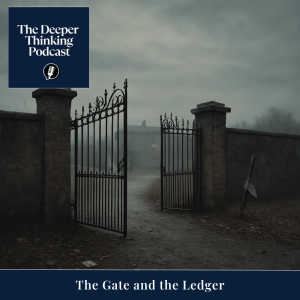
Saturday Mar 29, 2025
Saturday Mar 29, 2025
Who Deserves Help? The Philosophy of Deservedness and the Workhouse Legacy
The Deeper Thinking Podcast
Who decides if someone is worthy of aid? And what happens when help becomes a judgment rather than a gift? This episode unearths the moral logic behind the 1834 Poor Laws — where help was designed to hurt, and relief required the performance of virtue. But this isn’t just history. The legacy of deservedness lingers in every modern welfare system, policy form, and silent refusal.
The idea that people must earn help — by their labor, their compliance, or their suffering — is so embedded in our systems that we rarely question it. But what if the very act of moral filtering is the problem? Drawing from Bentham’s utilitarian logic, Malthusian fear, and Rawlsian justice, this episode reframes help not as something distributed by merit, but as something denied through design.
We follow the architectural cruelty of the workhouse, the silence of bureaucracy, and the emotional toll of being deemed undeserving — not just historically, but now. In this atmosphere of quiet exclusion, the question persists: who must suffer, and how visibly, before we offer care?
Why Listen?
Explore how 19th-century policy reshaped moral ideas about poverty, productivity, and worth
Understand how modern welfare systems still echo workhouse logic
Examine philosophical alternatives to merit-based care — Rawls, Sen, care ethics
Hear a compelling philosophical audio essay told through third-person narrative and historical tension
Further Reading
As an affiliate, we may earn from qualifying purchases through these links.
A Theory of Justice by John Rawls — A foundational text on fairness and distributive justice.
In a Different Voice by Carol Gilligan — Introduces care ethics as a moral and political framework.
The 1834 Poor Law Amendment Act — Primary source context for the historical pivot explored in the essay.
Listen On:
YouTube
Spotify
Apple Podcasts
Abstract
This audio essay interrogates the philosophical foundations of deservedness within systems of social aid, tracing the origins of moralized welfare through the 1834 Poor Law Amendment Act in England. By examining how utilitarian and Malthusian ideologies reshaped poverty as a moral condition, the essay reveals how suffering was institutionalized as a test of worth. The workhouse system—engineered to deter rather than assist—serves as a historical case study in the weaponization of help. Drawing from the ideas of Jeremy Bentham, Thomas Malthus, John Rawls, Amartya Sen, and care ethicists such as Carol Gilligan, the episode critiques how modern welfare systems continue to encode suspicion and judgment into their very design. Ultimately, the essay asks whether help must be earned, or whether it can be reclaimed as a right grounded in shared vulnerability and political responsibility.
Bibliography
Arendt, Hannah. Eichmann in Jerusalem: A Report on the Banality of Evil. New York: Penguin Classics, 2006.
Bentham, Jeremy. An Introduction to the Principles of Morals and Legislation. Oxford: Clarendon Press, 1907.
Gilligan, Carol. In a Different Voice: Psychological Theory and Women’s Development. Cambridge, MA: Harvard University Press, 1982.
Malthus, Thomas Robert. An Essay on the Principle of Population. London: J. Johnson, 1798.
Rawls, John. A Theory of Justice. Revised Edition. Cambridge, MA: Belknap Press of Harvard University Press, 1999.
Sen, Amartya. Development as Freedom. New York: Anchor Books, 2000.
United Kingdom Parliament. Poor Law Amendment Act 1834 (4 & 5 Will. IV c. 76). London: Her Majesty’s Stationery Office.
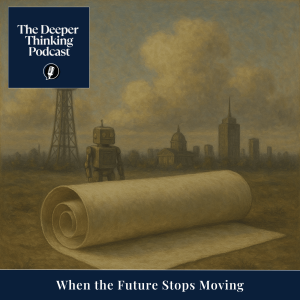
Saturday Mar 29, 2025
Saturday Mar 29, 2025
When the future stops movingThe Deeper Thinking Podcast
We often speak of crisis as collapse — visible, loud, definitive. But what if the deeper crisis is one of drift? What if the defining feature of our time is not destruction, but the quiet erosion of collective imagination? In this episode, we explore how wealth, knowledge, and tools are abundant — and yet the future remains unbuilt. The question is not whether we can act, but whether we still remember how to begin.
Drawing on the ideas of Hannah Arendt, Mark Fisher, and Byung-Chul Han, this episode considers the institutional, cultural, and psychological forces that have dimmed our capacity to dream in public. From bureaucratic liberalism to the attention economy, we trace how possibility has narrowed — not through censorship, but through fatigue and fragmentation.
We examine how thinkers like Ivan Illich, Simone Weil, and David Graeber offer not just diagnosis but renewal — reminding us that imagination is not fantasy, but structure. That to build is not to dream alone, but to invite others into a shared design for what could come next.
This episode invites you into a space of reflection — not to escape the present, but to encounter its unfinished blueprints. To ask what futures have been buried, and what it might take to unfold them once more.
Why Listen?
Explore the philosophical roots of political and cultural stagnation
Understand the impact of institutional inertia on the future
Learn how thinkers like Arendt, Illich, and Fisher diagnose our crisis of imagination
Discover how to reclaim imagination as a civic, philosophical, and moral act
Further Reading
The Human Condition by Hannah Arendt — On natality, action, and political beginnings. Amazon link
Capitalist Realism by Mark Fisher — A short guide to the sense of cultural impasse. Amazon link
Psychopolitics by Byung-Chul Han — On the internalization of control through self-optimization. Amazon link
Listen On:
YouTube
Spotify
Apple Podcasts
Abstract
This essay investigates the cultural, philosophical, and institutional causes behind modern liberal societies' inability to build meaningful futures, despite material abundance and technological capability. Drawing from thinkers such as Hannah Arendt, Max Weber, Mark Fisher, Simone Weil, and Byung-Chul Han, the essay argues that our present condition is not defined by collapse, but by drift — a failure of collective imagination to initiate, construct, and sustain shared futures.
The essay maps how institutional entropy, bureaucratic liberalism, and the commodification of attention have hollowed the imaginative capacities once embedded in governments, universities, and civic institutions. It redefines imagination not as fantasy, but as an applied political act — a structural ability to propose and enact alternate realities. In doing so, the essay resituates “imagination” as essential to moral and political agency, and closes by calling for its re-legitimization as a civic and philosophical imperative.
Annotated Bibliography
Arendt, Hannah. The Human Condition. University of Chicago Press, 1958.Introduces the concept of natality — the human capacity to begin. Arendt’s framing of action, freedom, and political space grounds the essay’s exploration of institutional stasis and the lost capacity to initiate.
Weber, Max. Economy and Society. University of California Press, 1978.Provides the foundation for understanding bureaucratic rationalization and the “iron cage” of modernity — a central metaphor in the essay’s critique of liberal proceduralism.
Fisher, Mark. Capitalist Realism: Is There No Alternative? Zero Books, 2009.Explores the cultural and psychological conditions that make it difficult to imagine alternatives to capitalism. Fisher’s concept of “realism” helps frame generational stagnation and institutional despair.
Han, Byung-Chul. The Burnout Society. Stanford University Press, 2015.Critiques the neoliberal emphasis on performance and self-optimization. Han’s work informs the discussion on attention economies and the saturation of public imagination.
Weil, Simone. Gravity and Grace. Routledge, 2002.Presents attention as a moral act and a spiritual discipline. Weil’s philosophy supports the essay’s closing argument: that stillness, attention, and re-imagining are preconditions for civic restoration.
Illich, Ivan. Deschooling Society. Harper & Row, 1971.Critiques institutional monopoly over learning and social reproduction. Illich’s theory is used to explain how institutions drift from creation to conservation.
Graeber, David. The Utopia of Rules. Melville House, 2015.Blends anthropology with political critique, arguing that bureaucracy often masks a deeper fear of freedom. Graeber’s work supports the call for imagination as structural intervention.
Taylor, Charles. The Ethics of Authenticity. Harvard University Press, 1991.Examines the decline of moral horizons in modern liberal societies. His warnings about procedural liberalism ground the essay’s critique of value-neutral politics.
Sandel, Michael. Justice: What’s the Right Thing to Do? Farrar, Straus and Giroux, 2009.Critiques value-neutral frameworks in democratic life. Sandel’s ideas are used to expose the limits of liberal neutrality in shaping moral and imaginative action.
Berlant, Lauren. Cruel Optimism. Duke University Press, 2011.Analyzes the attachments we maintain to harmful systems. Her concept helps unpack how young people remain tethered to dreams the system no longer supports.
Bloch, Ernst. The Principle of Hope. MIT Press, 1986.Philosophical foundation for the concept of utopia as a method of concrete imagining. Supports the essay’s framing of imagination as disciplined, structural, and ethical.









